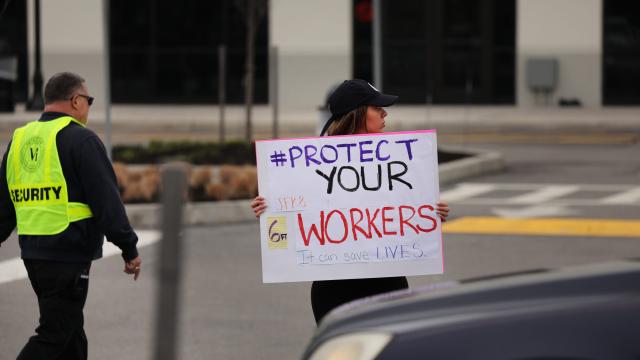The coronavirus has clarified the question of who is an essential worker in the truest sense of the word”the people who provide us with the bedrock on which society rests.
And how we treat those workers today is a bleak, precise preview of what’s to come in the climate crisis. So far, it’s a massive failure of largely unfettered capitalism, one that’s doomed to be repeated in a rapidly heating world unless corporations are held to account for treating employees like single-use plastic bags.
Across the country, workers have gone on strike or walked out at Amazon facilities, Whole Foods (also an Amazon subsidiary), and Instacart. The reason for their anger is simple: Companies worth billions of dollars are doing basically jackshit to help their employees on the frontlines of a crisis.
Most of their asks are simply hazard pay, safe working conditions, and expanded sick leave. As Bryan Menegus notes on Gizmodo, none of these people signed up to face down a pandemic while making piddling wages and receiving minimal or nonexistent benefits. In many cases, they’re trying to make ends meet in our increasingly hollowed-out economy. Companies fulfilling their requests for hand sanitizer and few extra bucks in their paychecks is the bare minimum they could do. And yet.
In response to Amazon warehouse workers, 500 of the company’s tech employees, including members of Amazon Employees for Climate Justice, signed onto a letter listing warehouse and logistic workers’ demands. It’s a powerful act of solidarity. And it reflects how we as a society need to be thinking about the concurrent crises of coronavirus and climate change and how they interlock with capitalism.
“Climate justice demands that we no longer view Earth and our fellow human beings as expendable resources to be exploited for the gain of a few,” Maren Costa, a principal UX designer at Amazon, said in a press statement. “Amazon needs to start by truly valuing”rather than just capitalising on”its own warehouse workers so that they feel respected, supported, and safe. Actions speak louder than words.”
Coronavirus is in some ways a sped-up version of the comparatively slow-evolving climate crisis, thrusting the prevailing inequalities and unfairness of our current labour system into the spotlight. We didn’t have to wait for a pandemic to find that out, of course. We only needed to open our eyes to the aftermath of the climate shocks that have roiled the world with increasing ferocity”think 2018 Camp Fire in California. In the wake of those climate disasters, the first people back to work are the same who are now toiling through a public health crisis: warehouse workers, grocery store clerks, pharmacists, and medical workers, among many others.
But climate shocks are local or regional at most. A few human interest stories will come out, climate people like me will remind you that the folks on the frayed edges of society are getting the most screwed, clean up will begin. Then, the world inevitably turns away after a few weeks and focuses on a dumb Trump tweet or the World Series or new Avengers movie.
The coronavirus, though, has cleared away all the distractions (aside from the dumb tweets). There is no turning away from a global health pandemic. And as the entire world essentially grinds to a halt, it clearly shows us who the most vulnerable members of society are and who are the most essential as well as their overlap. How we’re treating them exposes the failures of our current system that values profit margins over human life. And as long as companies like Amazon, Instacart, and others continue to treat their workers this way during a pandemic, they’ll just as surely treat them that way in the worsening climate crisis.
It’s why now is such a crucial moment in history. We’re at the start of the decade that will decide future generations’ fate. The pandemic doesn’t mean we can stop the fighting and organising to protect the climate and the most vulnerable among us. It’s a catalyst to push even harder.
